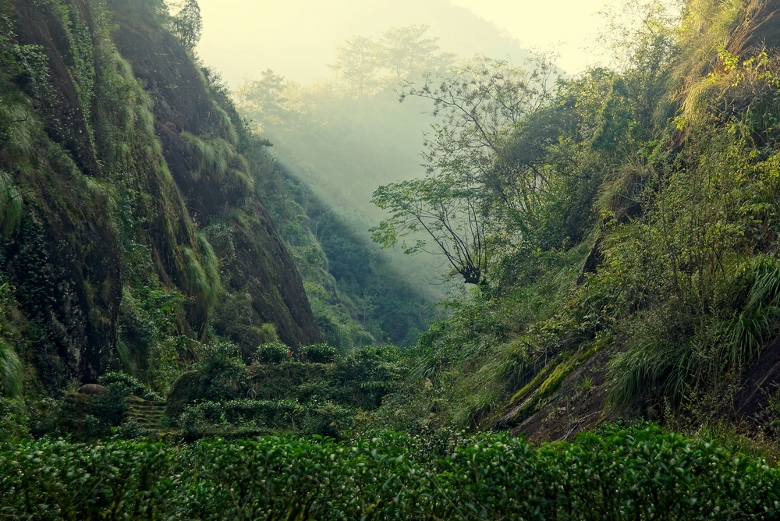Sipping Serenity Amid the Lush Tea Hills of Wuyi Mountains

Imagine wandering through mist-shrouded valleys where every breath carries the essence of ancient traditions mixed with the crisp air of lush China landscapes. At Jusha Travel, we’re thrilled to guide you through the Wuyi Mountains tea region in Fujian Province, where the serene beauty of China’s Wuyi Mountains tea heritage offers a perfect blend of tranquility and cultural immersion. As UNESCO World Heritage Site since 1999, Wuyi is more than scenery—it’s a living testament to Fujian rock tea culture, inviting travelers to discover scenic tea hikes that promise both adventure and inner peace. Whether you’re a tea enthusiast or a traveler seeking China tea hill serenity, this place embodies the soul of Chinese tourism. Ready to sip serenity? Let’s dive in.
The Enchanting Geography and Natural Beauty of Wuyi Mountains

The Wuyi Mountains, known as the “land of mist and clouds,” stretch across northwest Fujian and touch Jiangxi borders, creating a breathtaking tapestry of lush China landscapes. Featuring dramatic Danxia landforms—those towering red cliffs sculpted by millennia of water and wind—the area is a subtropical paradise with forests that stay vibrant year-round. The legendary Jiuqu Xi River snakes through in nine bends, offering serene boat rides amid rolling hills. Designated a UNESCO site, Wuyibushes preserve diverse wildlife and ancient temples, ensuring conservation since the Qing Dynasty. Visitors often describe the morning mists as “the lost paradise,” perfect for scenic tea hikes. For more insights into China’s natural wonders, check out our post on 10 Must-Visit Hidden Gems in China for a Unique Travel Experience.
Practical Tip: Plan your visit from March to May or September to November to avoid heavy rains and enjoy the clearest skies for those misty mountain views.
Unearthing Wuyi’s Rich Tea Heritage

Diving into the origins of Wuyi Mountains tea, you’ll uncover a history dating back over a thousand years, with imperial tea gardens established in the Ming Dynasty (14th century). Buddhist and Taoist monasteries shaped the Fujian rock tea culture, cultivating teas among stony outcrops. Legend links the mountains to brothers Wu and Yi, who channeled floods to create fertile valleys—possibly inspiring the name. Today, terraced gardens nestled in the hills remain peaceful havens for reflection.
The region’s unique terroir—volcanic soils, mineral-rich rocks, and misty mornings—produces teas with a signature “rock rhyme” (岩韵), blending floral, fruity, and roasted notes. For a deeper dive into Chinese tea culture, explore our guide on What Is Chinese Tea Culture and How to Experience It?.
Sampling the Famous Wuyi Teas: A Rock Tea Odyssey

Wuyi’s pride lies in its “Yan Cha” (Rock Tea), including the legendary Da Hong Pao (“Big Red Robe”), famed for complex roasted aromas and stone-fruit hints. Other stars like Rou Gui (spicy, sweet), Shui Xian (floral oolong), and Tieluohan offer diverse profiles. These Wuyi Mountains tea varieties, oxidized and charcoal-roasted, yield twisted leaves with a full-bodied minerality. The region’s elevation and subtropical climate foster slow growth, resulting in teas described as the “burgundy of tea” for their terroir-driven depth.
Fun Fact: Da Hong Pao mother bushes, safeguarded since the Ming era, yield only grams annually—making it one of China’s most precious teas.
To experience authentic tasters, join a gong fu cha ceremony at local teahouses. Learn more about China’s top cities and their culinary scenes in our article on Exploring China: History, Culture, and Modernity.
Serenity in Every Step: Scenic Tea Hikes and Tourism

Escape to China tea hill serenity on immersive scenic tea hikes through ancient gardens bordering misty temples and rock formations. Hike to the Da Hong Pao mother bushes for a meditative harvest experience, or raft the Jiuqu Xi for panoramic views. The integrated nature, history, and tea culture foster relaxation and reconnection.
- Da Hong Pao Tea Garden: Watch cultivation in preserved plots.
- Tea Tastings: Sample varieties amid traditional ceremonies.
- Bamboo Rafts: Glimpse verdant cliffs and tea groves.
This blend of tranquility and tradition makes Wuyi ideal for adventurous spirits seeking both. If you’re planning tea-inspired travels, our Hong Kong food guide at Hong Kong Food Advice: A Comprehensive Guide offers regional culinary parallels.
Modern Conservations and Cultural Continuity

Protected since the Qing Dynasty, Wuyi’s natural wonders thrive under UNESCO guidelines, blending tradition with eco-tourism. Strict protections preserve biodiversity and pure waterways, while modern vineyards incorporate sustainable farming. Fujian rock tea culture evolves through global outreach, yet maintains authenticity through community-driven initiatives.
Despite historical remoteness, Wuyi now welcomes travelers with advanced infrastructure, including eco-friendly lodges and app-guided hikes. For broader China adventures, visit our highlights on Top 10 Must-Visit Cities in China for 2025 Adventures.
Pro Tip: Support local initiatives by staying at community guesthouses and participating in cultural workshops.
Culmination: Embracing Serenity in Every Cup

As you depart the lush China landscapes of Wuyi Mountains, the memory of crisp Wuyi Mountains tea mingled with mountain serenity lingers. Here at Jusha Travel, we cherish sharing these authentic experiences that connect you to China’s soul—where Fujian rock tea culture meets unparalleled natural beauty. Whether it’s a solo retreat or a cultural journey, Wuyi promises renewal through its scenic tea hikes.
For more inspiration, explore our post on Best Places to Visit in China: Discover Iconic Landmarks and Hidden Gems. Share your tea travel dreams in the comments—what’s your favorite way to unwind in nature? Visit jusha.travel for more China travel gems and let your next adventure steep in possibility!

